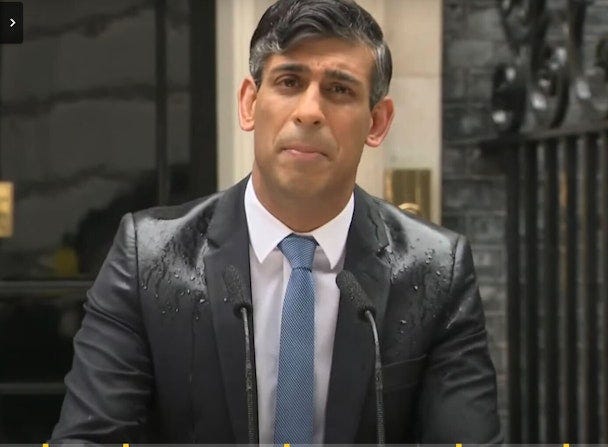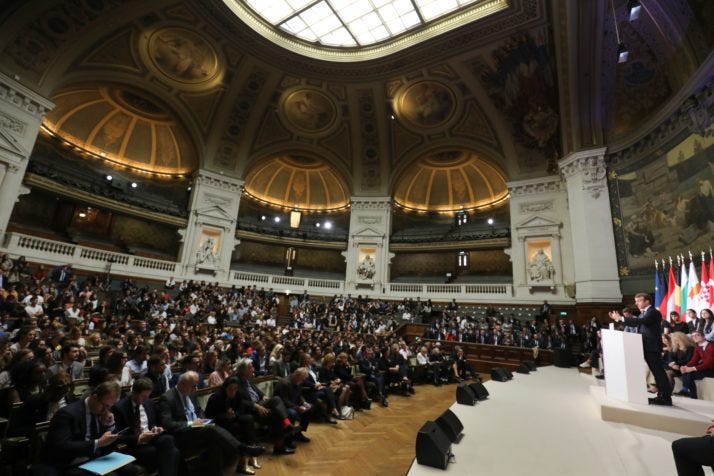First Draft #31: a newsletter on public language
Election special: Two speeches - why Emmanuel Macron is more interesting than Rishi Sunak
War of words: comparing the rhetoric of Rishi Sunak and Emmanuel Macron
Elections often end in humiliation for Prime Ministers. Rarer is the election that begins in humiliation. That was the story yesterday as a sodden Rishi Sunak struggled to announce a 4 July vote over the blaring chords of Labour anthem “Things Can Only Get Better”.
But how did things get so bad for our PM? To answer this question, First Draft today presents an analysis of the PM’s rhetorical shortcomings, via a comparison with a more successful politician: Emmanuel Macron.
A month ago, Macron gave a speech at the Sorbonne ahead of the European elections. His doomy address warned of mortal threats to Europe and the West. Then, last week at the Policy Exchange, in what we now know was also a pre-election pitch, Sunak struck a similarly dark note. The PM, like his French counterpart, spoke of existential threats and a period of heightened global danger.
Two thematically similar pre-election speeches. One inspired an Economist cover story and sparked debate among international policy watchers. One, er, didn’t. A comparison of the two addresses yields valuable lessons about writing. Here, then, are our reasons Macron outshines Sunak:
Macron has the confidence to admit his flaws…
Macron believes in Macron. Few leaders dance the line between arrogance and confidence more adroitly. And yet, close inspection of his speeches reveals they are full of self-deprecation. Here he opens, “We have not accomplished all we have set out to.” Then, a moment later: “The French did not produce the vaccine on our own soil. We must be humble enough to recognise this.” Manu is a master of “concessio”, the rhetorical technique of admitting your flaws. Owning up to failures adds weight to your words. “I am so confident,” it says, “that I can afford to concede this point”.
…but Sunak almost never does.
Sunak, by comparison, never uses concessio and rarely deviates from his default register: a kind of incessant fragile bluster. Failures are implausibly ascribed to external forces while national successes are greedily claimed. “We’ve always been an open, trading, maritime nation and Brexit has given us the opportunity to trade even more”. This would be more convincing if it came with an admission that these opportunities have been slow to materialise. But Sunak is never so frank. As a result, Macron appears to wrestle with reality, whereas Sunak chirps at us from his own willed version of it.
Sunak revels in cliche…
There is something of the AI bot about Sunak: “bold plans”, “back to square one”, “nation of optimists”. The problem isn’t just the dreary blandness. It’s that off-the-peg language implies off-the-peg thought. Surely an epochal “period of danger and transformation” demands deeper rumination. A few lapses into cliche would be forgivable. But when the deadest of dead political phrases — “our country is at a crossroads” — is the top line briefed to journalists ahead of the speech, as was the case with Sunak last Monday, we are forced to diagnose a rhetorical failure.
…Macron conjures surprising and potent images.
Macron’s language, meanwhile, feels alive. Even when conveying a familiar idea, he finds new ways to express it. Where Sunak talks vaguely about “dangers” and “threats”, Macron startles us with a stark anthropomorphism: “Europe is mortal. It can die.” That line made headlines. But the speech is full of unusual constructions and new angles. He talks of Europe’s “fragile humanism”. The continent is “not a counter where you can pick and choose your principles”. The “very French” concept of sovereignty has “gradually become European”. When familiar ideas arrive in new linguistic packaging it is evidence they have occupied a speaker’s mind.
Macron’s speech is long but well structured…
Macron’s speech is long. So long, in fact, that one may critique it as a macho display of intellectual and rhetorical stamina. But the wordiness is partly redeemed by structure. There is a logical flow: each section resolves tension established in the section prior. He opens with an assessment of Europe’s progress over seven years. He then gives a detailed survey of “mortal” threats to those achievements. Finally, he outlines solutions to those threats. These solutions are divided into three categories: Europe as a power; A Europe of Progress and Prosperity; and A Humanist Europe. As he moves through each solution, the tone shifts slightly — from tough to beseeching to idealistic — without sacrificing coherence.
…Sunak’s is short but incoherent.
Sunak also starts with a list of threats. We hear of war in Europe, illegal migration, “gender activists hijacking children’s sex education” and more. But he is so detail-light that it feels more like a list of headlines than a coherent analysis of a nation under pressure. He goes on: “But counterintuitive though it may seem, the greatest breakthroughs have so often come at the moments of greatest danger”. This is the hinge of the speech, which launches him into his second big theme: the UK’s technological and economic potential. Here we are given another list. We hear of AI, ozempic and a sportswear brand from Merseyside among other things. Again the problem is coherence. Sunak fails to connect, logically or tonally, the doomsterism of the speech’s first half to the platitudinous techno-utopianism of the second. Often in politics to make a mixed impression is to make no impression at all. This is where Sunak’s jumble gets him: nowhere.
Macron displays a deep curiosity about his subject...
Plonked in the middle of Macron’s speech is the line “We are the continent, the civilization, that undoubtedly invented self-doubt and self-questioning, the culture of confession.” Can you imagine anything so searching, or so interesting, passing the lips of Sunak? Macron’s statements about Europe have a depth only attainable through prolonged and profound contemplation — through close attention.
…Sunak’s interest feels shallow.
Then take Sunak’s depiction of the UK: “Nation of optimists”; “Britain’s spirit of discovery and entrepreneurship”; “our football teams”. It’s pure Johnsonian superficiality with none of the linguistic whimsy. There is no serious attempt to perceive, let alone grapple with, how Britain is now. Macron, by contrast, addresses the continent not only as a statesman but as a psychoanalyst or a close relative. He criticises because he cares.
Macron is a commanding and enthused performer…
Macron, winner of two presidential elections and leader of France for seven years, is by now a master political performer. And mastery comes with privileges. You can talk for two hours straight. You can admonish your own country. And you can stand in a venue as grand as the Sorbonne amphitheatre and match it with a grandeur all your own. He seems totally at ease on the world stage, or any stage for that matter, armed with a self-fulfilling belief that he can say what he wants, in the style that he wants.
…Sunak speaks like he has given up.
Sunak doesn’t have the same latitude. As his political fortunes dwindle one senses him clinging vainly to the strengths that accelerated him through politics. He has never been a compelling performer, but he did at least have a degree of polish and energy. Now even these meagre gifts are failing him. This was evident long before yesterday’s Downing Street drenching. Compare the Policy Exchange speech to his final outings during the Tory leadership campaign. Gone is the “we totally smashed it” vigour. The Blair-ish hand movements are no more. Last Monday, as he flatly informed us our “country is at a crossroads”, you felt he was yearning for a different journey entirely. The one to California, perhaps, or — to borrow a phrase from a true master of language — “that fine country called the fuck away”.
Jargon buster: Crossroads
In his doom-laden speech last week, Rishi Sunak said that Britain stands at the crossroads. Mr Sunak meant, as speakers always do, that a choice beckons. He is trying to make us picture two roads – one bright and Tory, one dark and Labour. But a crossroads presents three options, not two, in fact four if you consider the possibility of turning back from where you have come. The metaphor Mr Sunak is groping for is a fork in the road: Britain is on the right path, don’t turn left. Instead he has conjured up two paths, one to either side, and one going straight on. Which does he suggest we take? We have no idea. @PhilipJCollins1
Spent Force: the difference between “spending” and “investment”
This election, listen out for divergent definitions of money. Is a given flow of cash to be described as “spending” (bad) or is it “investment” (good)? Spending happens now and is a sunk cost. Investment happens in the future and offers a return on capital. The Tories will claim that Labour is profligate in spending money that rightfully belongs to taxpayers. Labour will redefine the question by stressing that no good thing comes without cost. In fact, the contest over these two words is a pithy account of a defining political difference and a precise reminder of what tends to happen in the cycle of British politics. In the name of investment, Labour eventually spends too much. In hostility to spending, Tory governments eventually invest too little. @PhilipJCollins1
Language and beyond
The PM’s soggy announcement echoed this classic rainy Partridge clip from The Day Today. Props also to Steve Baker for paying accidental homage to Partridge as he looked forward to life after politics.
Ahead of a new film about Samuel Beckett, the excellent Mark O’Connell on why biopics about writers hardly ever work. “The best way to make a writer interesting is to have him suffer a crippling bout of writer's block — to have him cease, in other words, being a writer”.
What is the meaning of life? Philosopher Galen Strawson reveals all in The Dublin Review of Books.
Can you lose your mother tongue? The NYT investigates: “A child who stops speaking a language before age 12 can completely lose it. For those who stop speaking a language in childhood, that language can erode — so much so that when they try to relearn it, they seem to have few, if any, advantages, Schmid says, compared with people learning that language from scratch. Even a language with very primal, deep connections can fade into the recesses of memory.”
People tend to think things are bad even when they’re good. That’s a good thing, argues Kevin Dorst.
A long but beautifully reflective piece on art, bereavement and memory by Julian Barnes.
Follow us
Last thing…
At The Draft we’re specialists in writing and rhetoric. We help businesses and public figures make their case more persuasively. If you could use our help, get in touch. And if you enjoy First Draft, forward it on. Thanks for reading.




